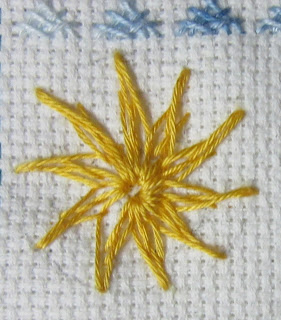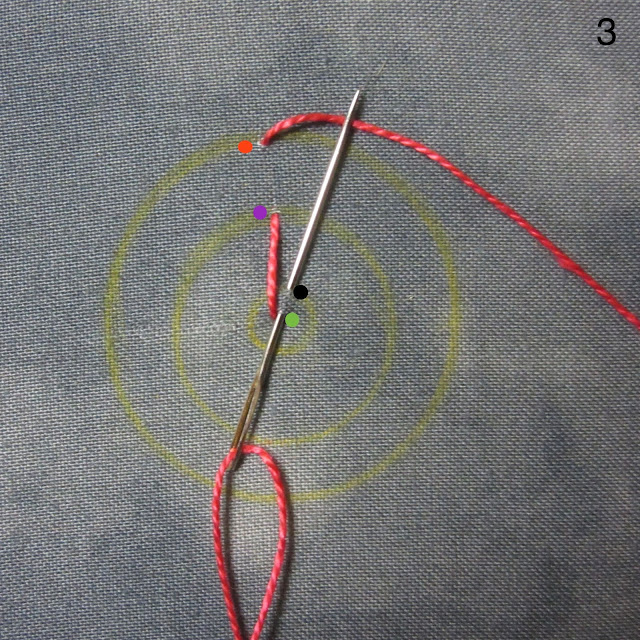Don't underestimate the dangers of climbing ladders! Sue, did. She stepped onto the ladder, missed a step and down she fell.
Ouch! She saw complex Chemanthy stars, Sprat's Head triangels and buttonholed Flies, her satin threaded Chained hair went flying in all directions, but her outfit still looked great. The Step ladder just stood there, steady and grinning!
Please learn from Sue, and take great care when climbing ladders!
Showing posts with label Chemanthy Stitch complex version. Show all posts
Showing posts with label Chemanthy Stitch complex version. Show all posts
Friday, 7 June 2019
Sunday, 2 June 2019
Sunday Stitch School - Revision: Stitches 96 - 100
As we have learned five new stitches, it is time for a revision lesson.
Click on the name for each stitch to get to instructions, pictures and homework.
96 Buttonholed Fly Stitch
This is such an attractive stitch, and easy, too. A must try stitch!
97 Satin Threaded Chain Stitch
Play with different threads, size and length of the 'legs'!
98 Sprat's Head
Originally a tailor's work stitch, it can be used for embroidery and embellishment, too.
99 Chemanthy Stitch, complex version
It IS complex, but not so complex that it is impossible. Once you have mastered it, it gives you great satisfaction.
100 Step Stitch
Hm, it looked good in Mary Thomas's Dictionary of Embroidery Stitches, but was hard to get even... I both like it and dislike it. Hm, I need to use it more to get better results.
So the question is how to use these five stitches for the
Revision Homework.
Well, here is a blurred teaser picture of the Sunbonnet Sue sampler I will make.
Click on the name for each stitch to get to instructions, pictures and homework.
96 Buttonholed Fly Stitch
This is such an attractive stitch, and easy, too. A must try stitch!
97 Satin Threaded Chain Stitch
Play with different threads, size and length of the 'legs'!
98 Sprat's Head
Originally a tailor's work stitch, it can be used for embroidery and embellishment, too.
99 Chemanthy Stitch, complex version
It IS complex, but not so complex that it is impossible. Once you have mastered it, it gives you great satisfaction.
100 Step Stitch
Hm, it looked good in Mary Thomas's Dictionary of Embroidery Stitches, but was hard to get even... I both like it and dislike it. Hm, I need to use it more to get better results.
So the question is how to use these five stitches for the
Revision Homework.
Well, here is a blurred teaser picture of the Sunbonnet Sue sampler I will make.
Friday, 24 May 2019
Friday Homework for Lesson 99: Chemanthy Stitch, complex version
You know the saying, 'better sleep on it'? This sleep might be good in many situations, for example when you are unsure of a purchase, you can 'sleep on it' and the next day you know whether to buy or not.
For stitching this technique is equally good I found, especially with this complex stitch. When I wrestled with it a couple of weeks ago it seemed impossible to master, but after a few nights' good sleep, it turned out to be easy, or at least easier than expected.
Here is my homework:
Aida Sampler
Teal Wool Tailoring Scribble Cloth
For stitching this technique is equally good I found, especially with this complex stitch. When I wrestled with it a couple of weeks ago it seemed impossible to master, but after a few nights' good sleep, it turned out to be easy, or at least easier than expected.
Here is my homework:
Aida Sampler
Sunday Stitch School Reference Chart
Teal Wool Tailoring Scribble Cloth
Sunday, 19 May 2019
Sunday Stitch School - Lesson 99: Chemanthy Stitch - complex version
Do you remember the beautiful Chemanthy Stitch?
Once again you need to place the thread underneath the needle.
Move a bit along the circle to start the new petal.
From now on you just need to repeat the same four steps.
It was Sunday Stitch School's #95 stitch, an Indian stitch that works up both fast and easily.
Do you remember that I told you it has a sister, a complex version?
Well, this 'sister' is the stitch we are learning today.
I have colour coded this project in the same way as Deepa did for the simpler stitch. I find it a help, but you might prefer to use the numbered dots instead.
The green dot, 0, is a main player.
First mark the three circles on the fabric,
then stretch your project tightly in a hoop or frame.
Now start stitching in this order:
Don't forget to keep the thread under the needle.
Once again you need to place the thread underneath the needle.
Move a bit along the circle to start the new petal.
From now on you just need to repeat the same four steps.
After having made a few petals you begin to get the rhythm and the stitch suddenly becomes an easy and addictive one. Good luck!
There are plenty of YouTube videos if you want to search for moving images.
Subscribe to:
Posts (Atom)























